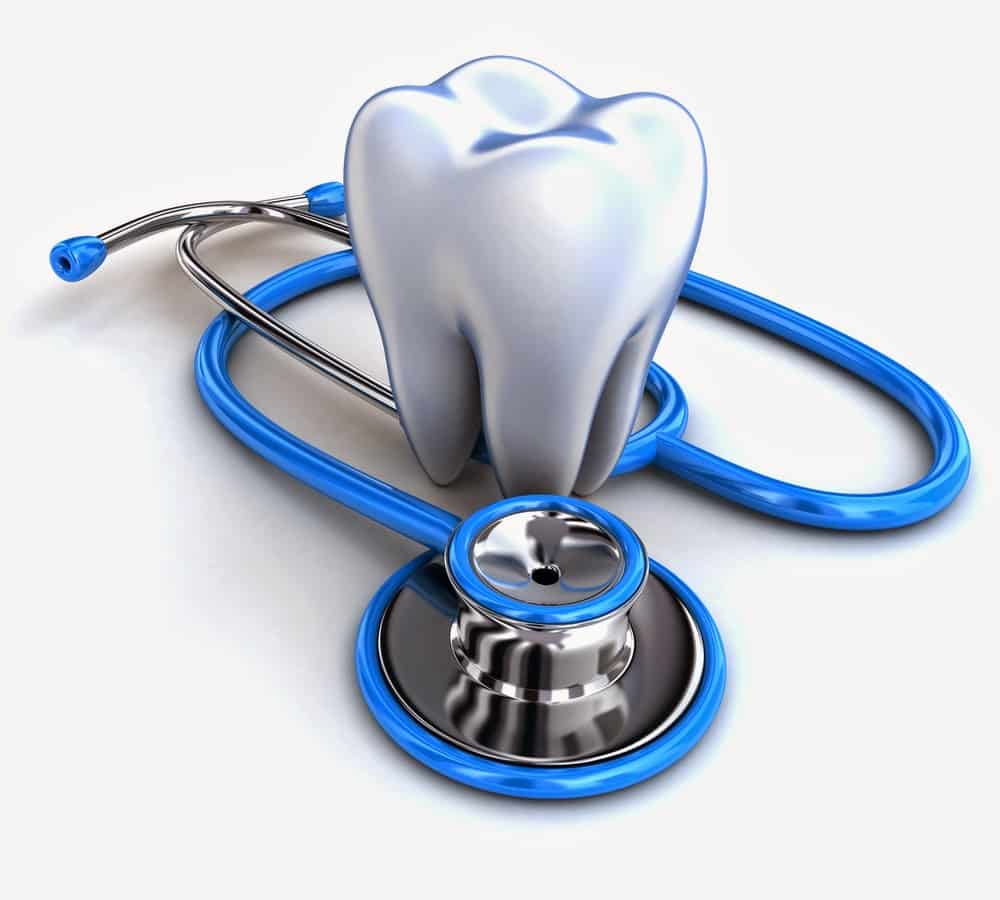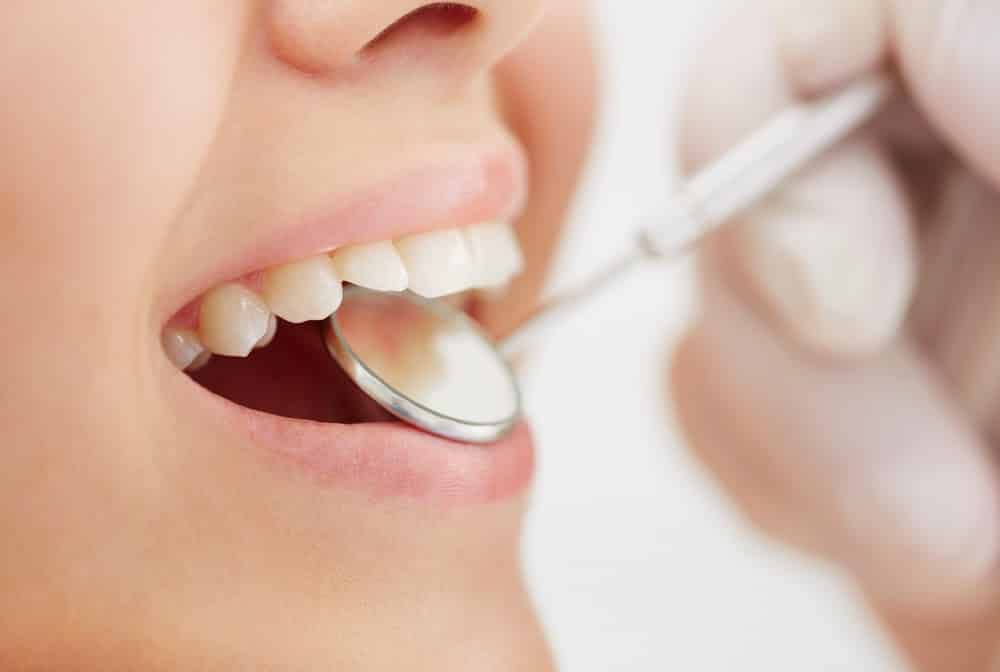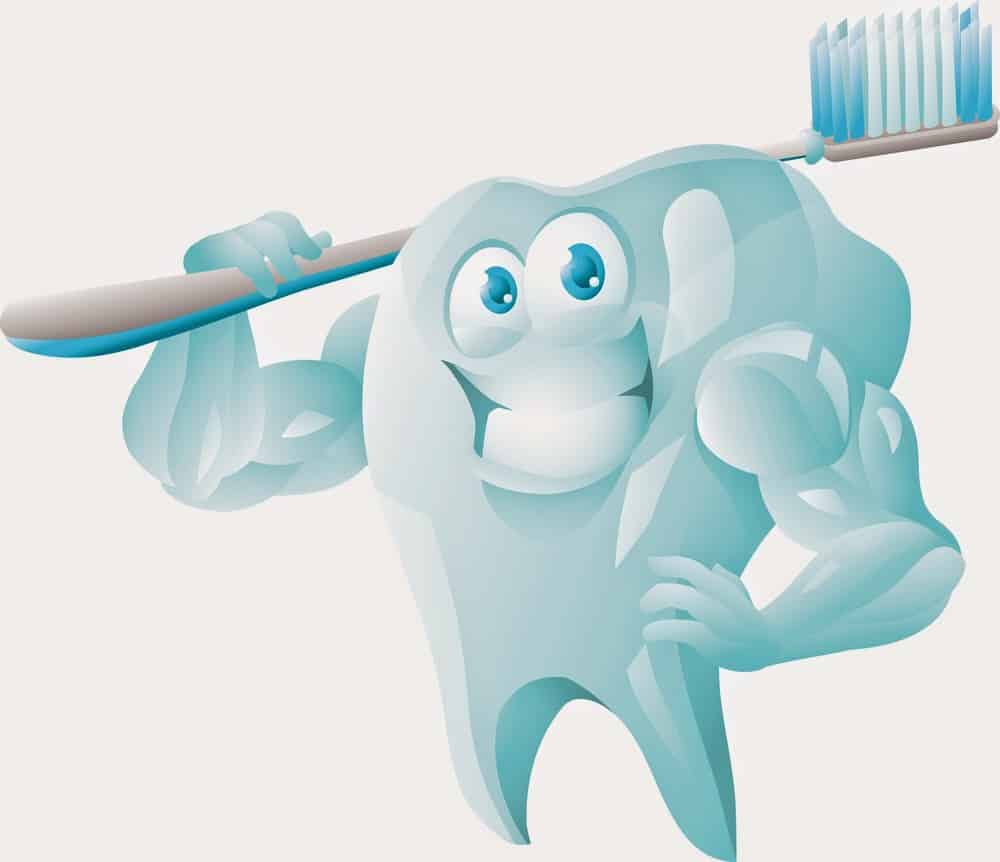Though many people are familiar with the advice that fluoride can help prevent cavities, not everyone understands how, or why it’s important. If you don’t, then you might skip checking if a certain toothpaste contains the mineral before you buy it, or you might not understand the significance if your dentist recommends a topical fluoride treatment. To clarify, we explain just how fluoride helps prevent cavities, and why it’s become a staple of effective dental hygiene.
Have you ever wondered how a cavity develops? It begins when bacteria found in dental plaque attack the enamel around your teeth by producing acid. Poor hygiene practices can leave your tooth enamel weak, and eventually, bacteria will infect the tooth with decay, and a cavity (hole) will form. Therefore, keeping your tooth enamel strong and effective is the cornerstone of preventing cavity formation.
Tooth enamel is made almost completely of specially-formed mineral crystals. The minerals consist mainly of calcium and phosphate, but enamel is also compatible with fluoride and other minerals. By applying fluoride, either through toothpaste or as a topical treatment at the dentist’s office, you can allow the mineral to bind to acid-weakened enamel, reducing your risks of forming a cavity.
As effective as fluoride is, it isn’t the most important element of cavity prevention. To keep your teeth safe, be sure to attend yourdental checkups and cleanings every six months, or as often as recommended by your dentist. In the meantime, be sure to brush and floss your teeth at least twice every day, and after each meal, if possible. Also, refrain from drinking sodas, fruit juices, energy drinks, and other highly-acidic and sugary beverages.
Dr. Quinn Smith is a well-respected and highly experienced general, restorative, and family dentist in Grand Prairie, TX. He takes a patient-first approach that starts from the moment patients enter our Pecan Tree Dental office, and he offers a three-year guarantee on all dental work that he performs. Whether you and your family are new or returning patients, you can schedule a consultation or your next appointment with Dr. Smith by contacting us at (972) 262-5111.
Your Dentist’s Warnings About Snoring
Your dentist warns you about a lot of things. Not brushing and flossing enough, eating too much too often, and skipping your dental checkups are among the more common warnings. What you might not realize, however, is that if your dentist knew you snore, you may also be warned about the dangers of not having your condition checked out and treated. As a general dentist, Dr. Quinn Smith has helped many patients stop snoring through customized dental treatment, usually in the form of an appliance that helps keep your airway clear while you sleep.
Facts About Snoring and Sleep Apnea
- Snoring occurs when nasal and oral tissues collapse into your airway when you sleep, partially blocking it. The noise is actually the sound of the walls and tissues in your throat vibrating, coupled with the sound of air struggling through a narrow space.
- Sometimes, the obstruction can totally obstruct your airway and force you to stop breathing. When this happens consistently, the condition is known as obstructive sleep apnea, and can pose a serious threat to your systemic wellbeing.
- Even in the absence of sleep apnea, snoring can increase certain risks to your cardiovascular system by restricting your intake of oxygen. Over time, the exertion to breathe and the diminished oxygen can begin to affect your vital systems, and lead to fatigue, illness, and other symptoms.
- The answer to stop snoring can often be found at your dentist’s office. Yet, if you have a severe case of sleep apnea, then you may require more specialized treatment at the hands of an oral surgeon. To find out how serious your snoring is, and to achieve, quieter, more peaceful sleep, visit us as soon as possible for a thorough examination.
ABOUT YOUR GRAND PRAIRIE GENERAL DENTIST:
Dr. Quinn Smith is a well-respected and highly experienced general, restorative, and family dentist in Grand Prairie, TX. He takes a patient-first approach that starts from the moment patients enter our Pecan Tree Dental office, and he offers a three-year guarantee on all dental work that he performs. Whether you and your family are new or returning patients, you can schedule a consultation or your next appointment with Dr. Smith by contacting us at (972) 262-5111.
Common Questions About Dental Emergencies
Though you might never experience a dental emergency, chances are you might at least have a fright or two. For instance, if you bite down hard enough on a popcorn kernel to make your tooth hurt, or if you notice blood when you brush and floss your teeth. If it is an emergency, however, then seeking appropriate treatment from your emergency dentist could be vital to saving your dental health. To help you recognize when it’s time to seek treatment immediately, we answer a few common questions about dental emergencies, and what to do if the time comes.
When is it considered an emergency?
In most cases, a dental emergency means your tooth and/or surrounding oral tissues are in immediate danger of serious damage or infection. Usually, this occurs in the form of a traumatic injury, like a fractured, broken, or knocked out tooth. Sometimes, though, it can also mean that a dental disease has progressed far enough to make discomfort (and possibly tooth loss) imminent.
Is it possible to prevent a dental emergency?
You can prevent a dental disease from becoming an emergency situation by addressing it early. Practicing good hygiene and visiting your dentist for regular checkups will significantly improve your chances of prevention and early treatment. In the case of accidental trauma, you might not be able to prevent the accident, but you may be able to prevent severe trauma with prompt attention from your dentist.
What should I do if my tooth is knocked out completely?
Once a tooth’s root is forcibly removed from its socket within your jawbone, there’s a small window of opportunity to successfully reattach the tooth. If possible, collect the avulsed (knocked-out) tooth and try to replace it in the empty socket. If it doesn’t fit, place the tooth in milk, call our office immediately, and bring the tooth with you to your visit.
ABOUT YOUR GRAND PRAIRIE EMERGENCY DENTIST:
Dr. Quinn Smith is a well-respected and highly experienced general, restorative, and family dentist in Grand Prairie, TX. He takes a patient-first approach that starts from the moment patients enter our Pecan Tree Dental office, and he offers a three-year guarantee on all dental work that he performs. Whether you and your family are new or returning patients, you can schedule a consultation or your next appointment with Dr. Smith by contacting us at (972) 262-5111.
How Dental Care Reduces the Risks of Respiratory Infections
Your dental health influences quite a lot more than just your smile. How your teeth and gums look can influence your confidence; your teeth’s alignment can affect how well your jaw and other facial structures interact; and in many cases, the health of your teeth and oral tissues can play a role in your overall wellbeing. In fact, according to a recent study, one of the more significant connections between oral and systemic health involves the role regular dental care plays inreducing the risks of respiratory infections.
Connecting Oral and Systemic Health
Oral-systemic health, or the mouth-body connection, describes the relationship between a health/unhealthy mouth and a healthy/unhealthy body. The source of most dental health issues, like tooth decay and periodontal (gum) disease, are the hundreds of types of bacteria that make up the plaque on your teeth and gums. When these germs grow in number, they can invade your bloodstream through infected oral tissues, or be inhaled into your respiratory tract, and become a serious threat to your systemic health, as well.
Regular Dental Care vs. Respiratory Infections
Ina study published by the Infection Control and Hospital Epidemiology, researchers determined that improved professional dental care significantly reduced occurrences of respiratory infections among patients being cared for in ICU (intensive care unit). Being unable to care for themselves, ICU patients are typically at an increased risk of developing oral health issues, as well as lower respiratory tract infections that begin with bacteria originating in the oral cavity. However, after introducing routine dental care to a randomized selection of ICU patients, Dr. Fernando Bellissimo-Rodrigues and his team noted that participants who received dental care were up to 56% less likely to develop a respiratory infection during their stay, compared to others.
ABOUT YOUR GRAND PRAIRIE DENTIST:
Dr. Quinn Smith is a well-respected and highly experienced general, restorative, and family dentist in Grand Prairie, TX. He takes a patient-first approach that starts from the moment patients enter our Pecan Tree Dental office, and he offers a three-year guarantee on all dental work that he performs. Whether you and your family are new or returning patients, you can schedule a consultation or your next appointment with Dr. Smith by contacting us at (972) 262-5111.
Questions About Cavities and Tooth Fillings
You can’t discuss tooth fillings without discussing cavities. After all, the infection that causes cavities (tooth decay) is the reason why fillings are necessary in the first place. Nevertheless, even patients who’ve received the restorations to treat tooth decay may still have questions about their cavities and tooth fillings, some of which we’ve answered below.
How will a tooth filling treat my cavity?
Regardless of how big it is, a cavity, or hole, will leave your tooth weak, and if not treated, the cavity will grow. A tooth filling involves cleaning and sanitizing the cavity to remove the bacteria and infected tooth structures. Once it’s cleaned, a filling is placed into the cavity and hardened for stability. The restoration helps keep your tooth strong and healthy while repelling bacteria from entering its inner structures.
Is a dental filling a viable alternative to root canal therapy?
Cavity treatment is relative, and depends on the severity of your tooth’s infection. While tooth fillings are great for mild to moderate tooth decay, more extensive tooth infection could require root canal therapy. If so, a filling alone won’t suffice, since the tooth’s inner chamber will have to be cleaned and the root canal sealed before the filling material can be placed.
What are tooth-colored fillings made of?
Many patients have, and still receive, metal amalgam fillings, though we typically recommend more discreet tooth-colored fillings, instead. Made from a mixture of acrylic and glass-like particles, known as composite resin, tooth-colored fillings not only blend in with your smile, but also create a more secure barrier against bacteria when bonded to your tooth’s structure.
ABOUT YOUR GRAND PRAIRIE DENTIST:
Dr. Quinn Smith is a well-respected and highly experienced general, restorative, and family dentist in Grand Prairie, TX. He takes a patient-first approach that starts from the moment patients enter our Pecan Tree Dental office, and he offers a three-year guarantee on all dental work that he performs. Whether you and your family are new or returning patients, you can schedule a consultation or your next appointment with Dr. Smith by contacting us at (972) 262-5111.
When Breath Goes Bad: The Causes of Halitosis
Bad breath doesn’t always mean that you need to seek immediate dental treatment, even if it doesn’t easily go away when you brush and floss your teeth. While it’s true that dental infections, like tooth decay and gum disease, can foul your breath as they progress, halitosis (chronic bad breath) could just mean that your hygiene needs some improvement—before an issue does develop. To help you understand the source of your potential embarrassment, we explain a few common causes of halitosis, and how they make your breath smell bad.
Common Causes of Bad Breath
Hygiene
Unclean teeth and gums can cause bad breath in a number of ways. By neglecting to clean them, you can allow food particles to remain in your teeth, which can rot over time and threaten your oral health, as well as your breath. Also, some oral bacteria (particularly the ones that linger on your tongue) tend to release unpleasant sulfur gases that can overwhelm your mouth.
Diet
Even if it doesn’t hang around for long, your food can contribute to persistent bad breath in numerous other ways. If you eat pungent foods, like garlic, the smell may not leave your mouth along with the food. If you don’t receive the right kinds and amounts of necessary nutrients, your body’s physiological responses can result in a foul smell being passed through your bloodstream and expelled from your lungs.
Illnesses
Besides oral health issues, some systemic illnesses can also contribute to bad breath, such as respiratory illnesses, diabetes, or gastrointestinal (GI) complications. If your bad breath continues after improving your hygiene, and your teeth and gums are healthy, then you may have an underlying health condition, and could be referred to your physician for treatment.
ABOUT YOUR GRAND PRAIRIE DENTIST:
Dr. Quinn Smith is a well-respected and highly experienced general, restorative, and family dentist in Grand Prairie, TX. He takes a patient-first approach that starts from the moment patients enter our Pecan Tree Dental office, and he offers a three-year guarantee on all dental work that he performs. Whether you and your family are new or returning patients, you can schedule a consultation or your next appointment with Dr. Smith by contacting us at (972) 262-5111.
How Porcelain Veneers Can Make You Smile
The beauty of cosmetic dentistry is that, no matter what’s affecting your smile’s appearance, there’s most likely a minimally-invasive cosmetic option to fix it. For instance, porcelain veneers can often be placed on one or more teeth to completely revamp their appearance without altering an excessive amount of tooth structure. If your issues are minor, we can also provide slimmer, quicker Lumineers, which require even less tooth preparation, or none at all.
What Do Veneers Fix?
Are your teeth stained, but teeth-whitening won’t brighten them? Do you have more than one tooth that needs improvement, but don’t want to place dental crowns on all of them? One of the main reasons why porcelain veneers are so popular is because they can improve more than one tooth at a time, with a variety of different cosmetic dentistry issues, including;
- Chipped tooth edges
- Discolored teeth (meaning stains that originate underneath the tooth’s surface)
- Slightly crooked teeth, assuming they don’t need orthodontic treatment
- Misshapen or “short” teeth
Quicker, Less-Invasive Lumineers
Veneers are thin, hand-crafted porcelain shells, no bigger than half a millimeter, and placing them requires slightly sculpting a minimal amount of tooth enamel. While the procedure is quick, the preparation to your teeth is permanent, and cannot be reversed. For patients with minor cosmetic issues, and who prefer a treatment that isn’t permanent, we also offer custom porcelain Lumineers, a thinner alternative to traditional veneers. Made from the same lifelike ceramic material, Lumineers offer nearly instance cosmetic improvement with little or no tooth sculpting needed.
ABOUT YOUR COSMETIC DENTIST IN GRAND PRAIRIE:
Dr. Quinn Smith is a well-respected and highly experienced general, restorative, and family dentist in Grand Prairie, TX. He takes a patient-first approach that starts from the moment patients enter our Pecan Tree Dental office, and he offers a three-year guarantee on all dental work that he performs. Whether you and your family are new or returning patients, you can schedule a consultation or your next appointment with Dr. Smith by contacting us at (972) 262-5111.
About Root Canals
A tooth’s root canal serves a number of different functions, from stabilizing the tooth from within your jawbone to offering a pathway for your jawbone to feed the tooth necessary minerals and nutrients. When you need root canal therapy, it’s typically because the soft tissues connected to the root canals are infected with decay. If not treated, the infection will continue to cause more severe damage, including tooth loss. The most important thing patients should remember about root canals is that treating them when they’re infected is vital to preserving the health and integrity of your smile.
Tooth Decay and Root Canals
Tooth decay is a bacterial infection in your tooth’s structure, and its severe form is the reason why root canal therapy is needed. As bacteria spread, they consume your tooth, leaving cavities in their wake as they make their way toward your tooth’s center (pulp). If you don’t treat the cavity in time, the infection will kill the tissues in your pulp and can potentially spread through the connected root canals.
Root Canal Therapy
A dental filling is only an alternative to root canal treatment if your cavity is detected and treated before it reaches the pulp. Otherwise, we’ll have to remove the infected tissues and seal the roots to prevent further infection, thenreinforce the tooth with a dental filling and cap it with a custom-made dental crown. To minimize sensation, we’ll anesthetize the tooth and surrounding area, and if necessary, we can administer dental sedation to help you relax for the duration of your procedure. After your tooth is restored, you’ll no longer feel the pain of the infection, and can resume your normal routines with a healthier, more confident smile.
ABOUT YOUR DENTIST IN GRAND PRAIRIE:
Dr. Quinn Smith is a well-respected and highly experienced general, restorative, and family dentist in Grand Prairie, TX. He takes a patient-first approach that starts from the moment patients enter our Pecan Tree Dental office, and he offers a three-year guarantee on all dental work that he performs. Whether you and your family are new or returning patients, you can schedule a consultation or your next appointment with Dr. Smith by contacting us at (972) 262-5111.
Important Reasons to Visit the Dentist
Keeping a routine schedule of dental checkups and cleanings is important, as most patients realize, but the reasons why may be more than most people suspect. Maintaining clean and healthy teeth and gums requires regular care from your dentist, and holding off dental diseases has a serious impact on your overall wellbeing. Among the most important reasons to visit the dentist, therefore, is to stop poor oral health from affecting your systemic health in any of a number of ways.
WHY Dental Health is So Important
When you brush and floss your teeth, and when your dentist or hygienist cleans and polishes them, the target is the plaque and tartar (hardened plaque) that clings on and between your teeth. Inside of these films are hundreds of kinds of bacteria, several of which are responsible for developing most dental health issues. In cases where extreme tooth decay or gum disease occurs, the compromised, bleeding tissues can allow oral bacteria into your bloodstream. Because of this connection (known as the oral-systemic connection), poor oral health, and particularly the presence of inflammatory gum disease, has been linked to several chronic health conditions, including;
- Inflammatory heart diseases, such as atherosclerosis (a disease of the arteries)
- Respiratory diseases, including chronic obstructive pulmonary disease (COPD)
- Diabetes
- Rheumatoid, or inflammatory, arthritis
- And more
When to Visit the Dentist Ahead of Schedule
While maintaining a set schedule of dental visits is important, sometimes you might notice trouble and have to visit the dentist ahead of schedule. If you notice any of the following symptoms of dental trouble, you should schedule an appointment as soon as possible;
- Tooth sensitivity (regardless of its severity)
- Tender gum tissues
- Swollen and/or bleeding gums
- Loose teeth
- Bad breath that doesn’t improve
- Dry mouth (decrease or cessation of saliva production)
- Any other forms of dental discomfort
ABOUT YOUR DENTIST IN GRAND PRAIRIE:
Dr. Quinn Smith is a well-respected and highly experienced general, restorative, and family dentist in Grand Prairie, TX. He takes a patient-first approach that starts from the moment patients enter our Pecan Tree Dental office, and he offers a three-year guarantee on all dental work that he performs. Whether you and your family are new or returning patients, you can schedule a consultation or your next appointment with Dr. Smith by contacting us at (972) 262-5111.
Is There a Way to Make Teeth Stronger?
Did you know that your teeth are the strongest parts of your body? Did you also know that, in some ways, they’re also the most vulnerable? Your teeth are unique in how they interact with the rest of your body, and in how they react when injured or afflicted with an infection (tooth decay). Understanding how and why they’re so exceptional can help you make your teeth stronger, and healthy enough to last a lifetime.
Teeth Strength and Vulnerability
Several different things factor into the incredible strength of healthy teeth. For instance, they’re supported by roots that are deeply embedded within your jawbone, like the foundation of a tall building. Teeth are also coated and protected by a thin, but super-resilient, layer of enamel. Semi-translucent tooth enamel is semi-translucent, and made entirely of mineral crystals and proteins. While enamel is the strongest substance your body produces, it can grow weak when it’s exposed to acids, when poor hygiene allows bacteria to overwhelm your teeth, or when your teeth are subjected to constant undue pressure (i.e., chronically grinding your teeth).
Tips to Strengthen Teeth
So how do you stop enamel from growing weak? Organic acid is enamel’s greatest enemy, mainly because it’s the most persistent danger. Whenever you eat or drink, sugar and carbohydrates are converted into acid by the bacteria in your mouth. Along with any acids that your meals and beverage already contain, the bombardment saps your teeth of minerals and attacks their enamel. You can keep your teeth strong and resilient by;
- Brushing and flossing at least twice every day to clean away acid-producing bacteria (found largely in dental plaque)
- Drinking more water, which helps automatically neutralize acids
- Consuming more dairy products, like milk, that contain a wealth of calcium, phosphate, an vitamin D (building blocks of tooth enamel)
- Drinking less soda, which attacks your teeth on several fronts with its high sugar AND acid content
ABOUT YOUR GRAND PRAIRIE DENTIST:
Dr. Quinn Smith is a well-respected and highly experienced general, restorative, and family dentist in Grand Prairie, TX. He takes a patient-first approach that starts from the moment patients enter our Pecan Tree Dental office, and he offers a three-year guarantee on all dental work that he performs. Whether you and your family are new or returning patients, you can schedule a consultation or your next appointment with Dr. Smith by contacting us at (972) 262-5111.

















